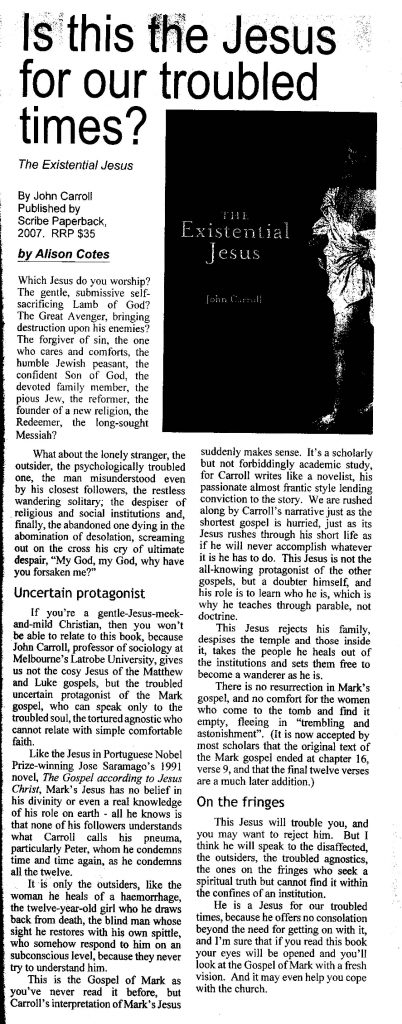This review that was published in the Brisbane Anglican newspaper, in John Carroll’s words, “quite brilliantly catches the flavour of what I have attempted to do” (email correspondence: 13/03/07)
Technorati Tags:
ExistentialJesus, JohnCarroll, Existential_Jesus, John_Carroll, Existential-Jesus, John-Carroll, Existential.Jesus, John.Carroll
If you enjoyed this post, please consider donating to Vridar. Thanks!


I read the article in the Courier Mail on Sunday May 8th 2007 and noted the comment “Mark’s Jesus dies not in triumph, but despair, with the most painful cry of all – “My God, My God, why have you forsaken me””. I have heard this said before by others, and can understand how to us it would seem true, but had he instead said “The Lord is my Shepherd, I shall not want” we would mostly remember that these were the first words of the twenty third psalm, and we would probably be able to quote several more lines, or even verses. When Jesus though said “My God, [etc]” he was quoting the first words of the twenty second psalm, and I would imagine that all Jews present at thatn time, who learned the Psalms by rote, would have gone on and maybe really been shocked especially when they got to vers 16 “Dogs have surrounded me, a band of evil men has encircled me, they have pierced my hands and my feet, [17] I can count all my bones, people stare and gloat over me, They divide my garments among them, and cast lots for my clothing”. I suppose Jews may have the gained a glimmer of what was being played out before their own eyes, the Romans would have merely thought the foolish man had finally realised his mistake.
I think I have less confidence in the historicity of the scene but as a literary scenario I think I agree in that it speaks volumes. He is an outcast of both god and man, a cosmic outcast even (darkness for 3 hours). And images as from a nightmare follow: he once loved a Simon and now a Simon appears to help execute him; his mother once longed for him but now comes as an unrelated “Mary” to bury him; even his Elijah witness has become a mere figment of public imagination.
The whole scene of his cosmic exit is bound up with his entry into the world: the heavens are torn at both ends (1:10 and 15:38) and God is declared present or absent; his first dramatic act is to expel a spirit with a loud voice after the spirit begged to be left alone and all were amazed, his final act is to expel his own spirit with a loud voice after bystanders beg him to be left alone — and a sole centurion is amazed according to the popular interpretation.
Is this existentialism at work? Or is there a clue that some other cosmic scenario is in the author’s mind when we read that odd scene with the Son of Timaeus, the namesake of Plato’s cosmic treatise that also speaks of a cross as a gateway between two universes?